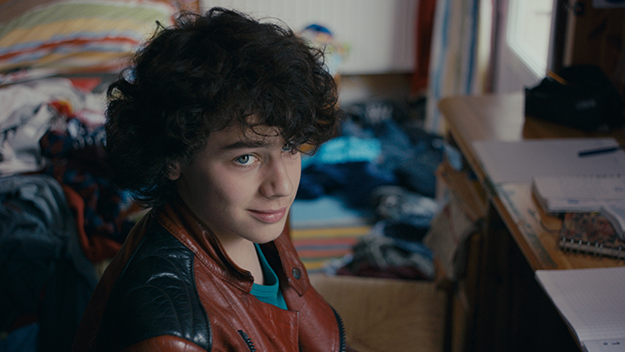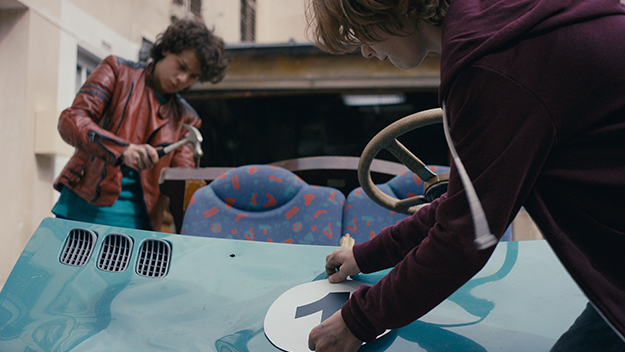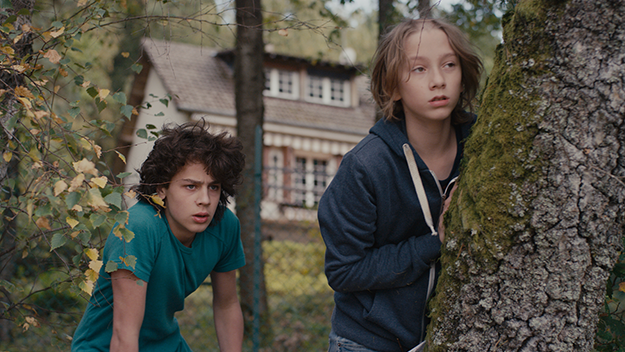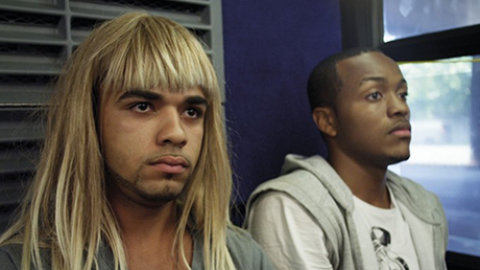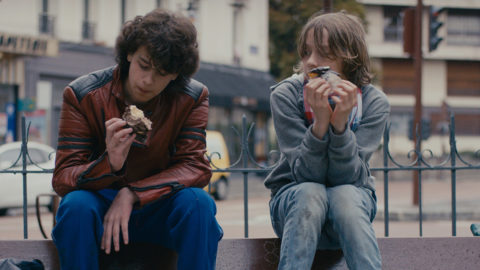Film of the Week: Microbe & Gasoline
In film, it’s simply not true that you can never go home again. Sometimes it’s the only sane thing to do—but you have to go home to the right place, and in the right way. One of the most likable, but also one of the most frustrating of contemporary filmmakers, Michel Gondry certainly went home again when he made his 2013 film Mood Indigo. This followed a long American sojourn that included the impersonal superhero spoof The Green Hornet (11), and represented a homecoming in several ways: Mood Indigo was a thoroughly French film, based on a much-loved French novel widely considered quintessentially unfilmable, Boris Vian’s poetic, playful L’Écume des jours. And Mood Indigo was undoubtedly a passion project imbued with a tinkerer’s whimsy that was Gondry to the hilt. It was, however, a cumbersome, confused mess—at best, a Pyrrhic victory of unrestrained self-expression. That kind of homecoming, clearly, doesn’t do anyone much good.
In his new film, however, Gondry has returned to roots, and to French cinema, in a different, altogether more bracing way. Microbe & Gasoline is among his simplest films; after some of his recent excesses, it feels like his detox movie. It’s a fond, unfussy, affable, and extremely casual comedy about two French teenage boys—and, given that it’s set in Gondry’s own home town of Versailles, it looks for all the world like an autobiographical work. Gondry’s second film to be cast with young unknowns—following his 2012 South Bronx ensemble piece The We and the I—Microbe and Gasoline is a gentle contemplation of male friendship and the dreams of adolescence, in the form of a road/buddy movie that, unusually for Gondry, is only sometimes overtly goofy.
“Microbe”—as he’s known at school because he’s short—is a 14-year-old boy named Daniel (Ange Dargent) who is often mistaken for a girl because of his long hair, and who is a natural artist. His drawing prowess takes in a series of punk portraits inspired by his older brother’s inept band, and a series of cartoons of naked women intended for private use only; after frustratingly climax-free attempts to masturbate, his sketches are quickly stashed away under his mattress. Daniel lives with his two brothers and a keyboard-playing mother who’s currently hooked on an insipid New Age version of faux-science mixed with Christianity; a glimpse of a conference where delegates listen to vapid hogwash while guzzling quinoa is one of the film’s more surreal digressions. Maman is played by Audrey Tautou—and the thought that French cinema’s erstwhile gamine queen, Amélie herself, is now playing harassed moms reminds us that we’re none of us getting any younger.
Daniel is disconsolately sketching classmate Laura (Diane Besnier) and her lustrous hair when in walks a mouthy new kid in school, antique dealer’s son Théo (Théophile Baquet). Théo has an answer for everything, and a very early-’80s bouffant that wouldn’t have been out of place in a John Hughes movie—suggesting that, while the film features such modern impedimenta as iPhones, the story is really set in an eternal ’80s of Gondry’s own youth.
As it happens, the 21st century is pretty much given its marching orders here: Daniel’s iPhone ends up accidentally being shat on in a ditch and then abandoned, and when the boys hit the road, they proudly navigate using awkwardly unfolded maps, priding themselves on still inhabiting the “Paper Age.” All in all, as you’d expect from Gondry heroes, these are defiantly analog kids: in the Internet era, there’s little that’s more analog than hand-drawing your own masturbation aides.
Théo is a natural clown, gentler and more ruminative than his own rebel uniform, a cheap red plastic/leatherette jacket, might suggest. His pride and joy is a moped jazzed up with a set of sound effects boxes—everything from cheering crowds to brass fanfares to “bada-boom!” drum rolls to accompany gag punch-lines. He’s also into tinkering with engines at his dad’s workshop—hence the petrol smell that causes him to be dubbed Gasoline, in French Gasoil, pronounced “Gaz-wal.” He and Microbe are not just natural allies (“Let’s face it,” says Gasoline, “we’re not exactly normal”) but, you can’t help concluding, the two complementary sides of Gondry himself: the shy reclusive sketcher, and the exuberant fabricator of improbable objects designed to fill the world with color and noise. The duo are also natural cousins to the heroes of Gondry’s paean to the VHS age, Be Kind Rewind (08); perhaps some day Microbe & Gasoil Deux will see the duo discovering movies and doing their own “sweded,” or “Frenchied,” versions of Les 400 Coups.
The film gets into properly Gondry-esque gear when the boys decide to have—as the Hold Steady song puts it—a “constructive summer” and build something crazy, just as inventor’s grandson Gondry himself no doubt used to do. Raiding a local scrapyard, they cobble together a bedframe, a motor, a stack of timber and end up making something that begins as a primitive car but ends up as a house on wheels—a vehicle disguised as a garden shed, to pass unseen at the sides of motorways. This deliciously absurd idea—it even has a wooden flap that drops down to disguise the wheels—is shown to best advantage in a lovely scene in which two quizzical cops inspect it, then take a beaming selfie with its cheerful pots of geraniums.
A leisurely road narrative, built around Microbe’s pursuit of his beloved Laura, doesn’t yield that many adventures as such, rather drifts into unlikely digressions. One is an encounter with a neurotic dentist (Laurent Poitrenaux) suffering from a bad cast of empty nest syndrome; another is Microbe’s attempt to get a haircut in the Burgundy town of Auxerre, where he attracts the terrifying attention of some Asian masseuses and a young gang boss. The payoff of this admittedly slender thread—a face-off with a team of hard nuts in American football gear—is an improbable but sweet vignette of triumph against the odds.
With its terrific, sweetly exuberant leads, and with Gondry’s fabulous ease at evoking the lazy anarchic feel of bored teenage classrooms, Microbe & Gasoline is a charming, fascinatingly awkward oddity: too flip and sweet-natured to be obviously appealing to adult lovers of French art cinema, too digressive, melancholic, low-key and gently raunchy to classify as a children’s movie in any usual sense. But it reminds me, in a less abrasive minor-key way, of a terrific French high-school comedy of a few years ago, cartoonist Riad Sattouf’s underrated Les Beaux Gosses (aka The French Kissers, 09), another autobiographical lark about two male misfits, their teenage longings, and their embarrassing parents. It’s also very much a film that harks back to the freewheeling spirit of early New Wave, particularly Truffaut—but more than his features, I’m thinking of his 1957 short Les Mistons, with its young boys in a libidinous spin over Bernadette Lafont on a bicycle. After the bulimic excess of Mood Indigo, you could hardly imagine a more refreshing return to some sort of cool measure, but as often happens with these things, there’s a degree of sobering melancholy involved. As Microbe’s mum says when he returns from his travels, “You’ve grown, Daniel.” “No,” he replies ruefully, “everything else has shrunk.”
Jonathan Romney is a contributing editor to FILM COMMENT and writes its Film of the Week column. He is a member of the London Film Critics Circle.



